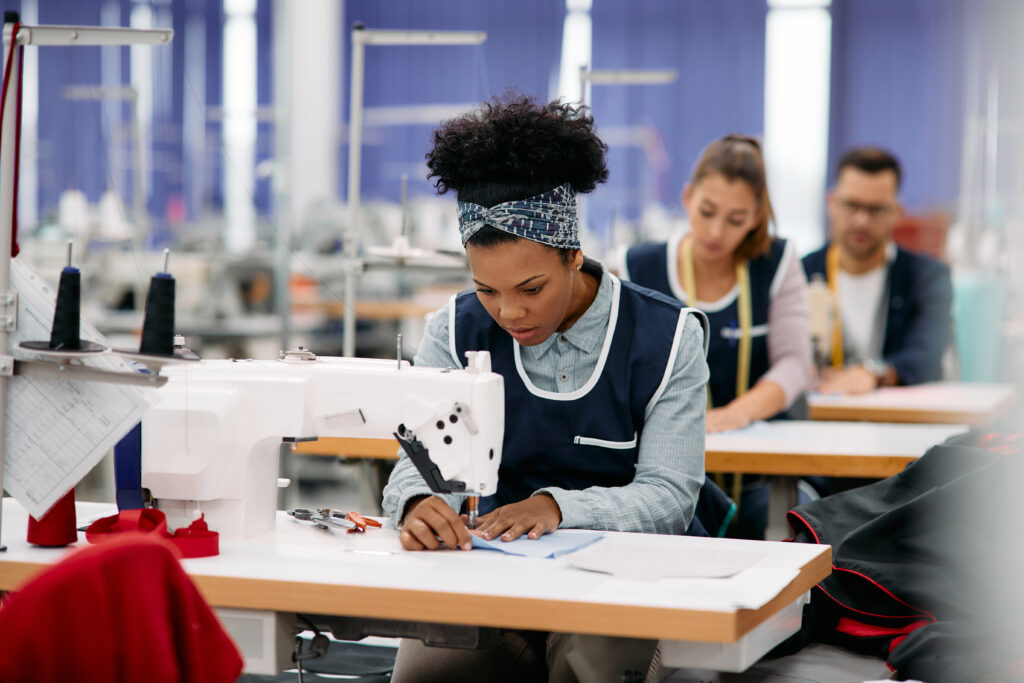With 2030 just a short five years away, manufacturers are looking for support and resources to scale up their ambitions to decarbonize while meeting ever-changing brand requests.
There isn’t enough time in the day to answer the myriad of data and auditing requests, or order inquiries, and yet they are tasked with making step changes in CO2 reduction. Where does one even begin?
As part of a convening force for fashion and consumer goods with a variety of manufacturer members, Cascale decisively launched its Decarbonization Program in 2021, as part of a serious approach towards combatting climate change. When I first joined Cascale three years ago, I knew the task at hand would require significant attention and a more open and educational approach not unlike the environmental management and auditing courses I am used to teaching at the University of Hong Kong.
With that in mind, we got to work in building the Decarbonization Program and the basis of it was beginning with manufacturers first – not last. We launched our Manufacturer Climate Action Program (or MCAP) in 2023, not long after.
MCAP is an important part of Cascale’s Decarbonization Program – driving collective action at scale by supporting decarbonization efforts together, directly, with member and non-member manufacturers in reducing emission 45 percent by 2030. We know that more than 76 percent of the value chain emissions come from manufacturing. This is what we are focusing on. Out of that 76 percent figure, nine percent comes from Tier 1 product assembly units, while Tier 2 material production mills account for more than 50 percent of the emissions, and Tier 3 materials processing accounts for 15 percent. By pinpointing emissions hotspots in the value chain and working hand-in-hand with manufacturers, we find the most effective outcomes, and hope to build on the program even more from the 70 participating manufacturers engaged in 2025.
In its essence, MCAP represents a cornerstone of decarbonization, helping manufacturers establish, measure, and refine their greenhouse gas emissions baseline in order to set reduction targets and track their progress. It’s a step-by-step process, MCAP facilitators provide guidance direction for manufacturers’ decarbonization roadmaps so that both short-term needs and long-term ambitions are realized. Since launching, MCAP has grown to over 70 participants, in 2025, and garnered unique and lasting sustainability use cases for our manufacturers. According to our analysis of the MCAP program using data from program participants, the CO2 reduction potential is an estimated 419,607.92 tCO2e from 16 validated companies.
It’s about putting this data into action. We have a mission here at Cascale to continue scaling MCAP to support manufacturers globally to accelerate their science-aligned targets and support and encourage them to take swift climate action. Additionally, MCAP provides manufacturers with the tools and resources to meet growing expectations from brands and regulators, offering third-party validation, climate risk assessments, and best practices to ensure measurable progress. But more than that, it’s about what our manufacturer participants are saying.
And they are sharing more and more about their positive experiences in the program. At the Cascale Forum: Ho Chi Minh City, My Nga Trade Co. Ltd.’s director of events, Cherry Liu, offered a glimpse behind the scenes as an MCAP participant.
“Our team gained valuable training on sustainability best practices and carbon accounting standards.One of the most valuable [features] in MCAP was gaining guidance and support throughout our emissions reduction journey. The program helped us move from intention to action, goals into a clear, data-driven plan. Cascale’s support in setting and validating emissions targets, through training, provided necessary knowledge… The training was helping our team to get knowledge in identifying and analyzing climate-related risks, clearly identifying heat-related physical risks as a top concern for our facilities – such as roof insulation and improved ventilation. These are now part of our ongoing resilience strategy,” said Liu. “If you are just beginning your sustainability journey the most important advice is start small, stay consistent, and focus on data. Here is what we’ve learned: Don’t wait for perfection, you don’t need all the answers to begin with, start with what you can measure now – such as energy use, water, or material waste – and build from there. Invest in awareness education across your team. A shared understanding for sustainability goals helps drive change from the ground up, using available tools such as the Higg Index for tracking.”
–Cherry Liu, Director of Events, My Nga Trade Co. Ltd.
It will take all value chain players to scale up MCAP and wider decarbonization aims – including brands.
Brands can be involved in various ways: they can nominate their manufacturers to join MCAP as well as directly sponsor their suppliers to be part of MCAP. We do have multiple brands that are co-investing and cosharing the program cost with their shared manufacturers.
One thing is certain. Ultimately, and for the industry to reach its ambitious goals, we have to recognize the cost burden can’t fall on any one group. We must support manufacturers’ ambitions to decarbonize because it’s often their communities and their facilities on the front lines of the climate crisis.
Those eager to explore MCAP can submit their interest to join the next cohort, kicking off in October 2025. Learn more about MCAP’s role in driving sustainable change by registering for the next MCAP Information Session, and learn more about MCAP on our website.







